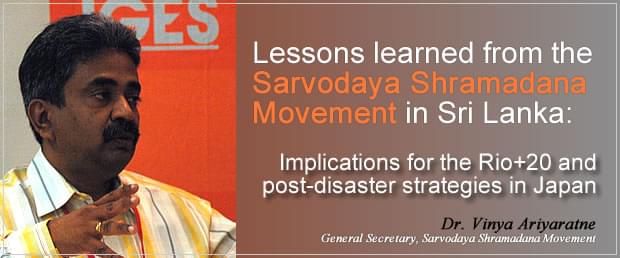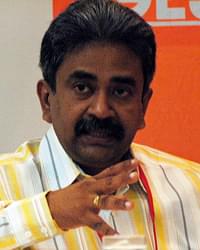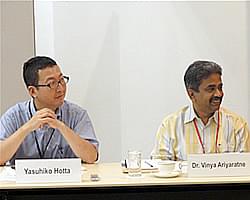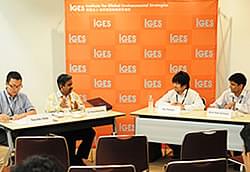|  |
Greening the economy will be essential for moving forward to sustainable development and poverty eradication on a global scale, which is one of two thematic issues at Rio+20. Simultaneously, Japan needs to build more a sustainable and resilient society in the face of the unprecedented disasters due to the tsunami and nuclear power accident in March 2011.
Dr. Vinya S. Ariyaratne, General Secretary of the Sarvodaya Shramadana Movement in Sri Lanka, has long been engaged in socio-economic development activities at the community level, as well as in recovery programmes from the tsunami in 2004. We asked his views and opinions about green economy as well as about post-disaster strategies in Japan, based on his substantial experiences. |
 | Vinya S. Ariyaratne
General Secretary, Sarvodaya Shramadana Movement |
|
Sarvodaya Shramadana Movement
---The Sarvodaya Movement is very popular; could you please highlight its goals, basic values and development models that you are promoting?
Dr. Ariyaratne:
Sarvodaya is the largest people’s organisation in Sri Lanka, which has been intensively working for socio-economic development in thousands of villages over the past 50 years. Currently, it is interna-tionally recognised as one of the best models for participatory development.
Our basic concept is that awakening ourselves should come first and individual possessions including labour, intellects and ideas should be provided as a next step so as to awaken our families, society and country. Development should be perceived not only from the perspective of physical satisfaction but also spiritual and cultural maturity, which could be achieved through some actions such as education, healthcare, and environmental conservation. In line with this philosophy, Sarvo-daya has successfully created a platform for all classes of society to be involved in constructive ac-tivities to empower themselves and communities in the various fields, such as micro finances, sani-tation improvement and legal training.
Sarvodaya has now made strategic shifts in its development approach along with the changes in socio-economic conditions. Accumulated experiences over the 50 years have taught us the importance of governance; people are poor not due to lack of resources per se, but due to lack of proper governance. Therefore, Sarvodaya’s focus is now shifting from direct participation in developmental works to facilitation and empowerment of societies by means of education, training, and informa-tion-sharing.
---What has been the greatest challenge in Sarvodaya? Also, has there been any corruption?
 |
Dr. Ariyaratne:
Some of the challenges came from the existing system of the state, as party political structure may have been threatened by this community empowerment process. We had actually two occasions when the government attempted to suppress the movement at the early stage. Generally, the party political structure in Sri Lanka dislikes civil society organised by stand-alone parties, and did not recognise the effectiveness of grass-roots activities. However, some are getting to be integrated in the rural devel-opment policies to this date.
Corruption did exist in the structural system and worsened during the war periods. Further, international loans have come into the country recently, and contracts are often awarded to parties having political patronage. We can say we are facing a big challenge, namely, bad governance, as a nation.
--- Each local community has its own governance system based on local practices, so how can your activities integrate this aspect? Also, how can Sarvodaya philosophy be applied to other countries in spite of different cultural, social and economic circumstances?
Dr. Ariyaratne:
Every community has its own informal system including farmers and water management groups. These should not be replaced by others, rather they should be strengthened based on their own de-mands. In principle, Sarvodaya does not approach villages on its own will except in extreme cases, but responds upon their direct request. We support community organisations and encourage their own system such as membership base, a constitution and elected officials to manage their own development path.
As cultural and ethnic interaction may generate a positive energy for cooperation owing to the beauty and uniqueness of each, appropriate opportunities for interaction among the various commu-nity groups will be essential for development, regardless of economic levels and social conditions. In this sense, our basic concept of self awakening and contribution to others in a society could be equally applied to other countries.
Towards sustainable development and green economy
--- Developed countries may need to review their own mass consumption lifestyles and pursue a more sustainable development model. In this sense, what do you suppose is the ideal development path for both developed and developing countries?
Dr. Ariyaratne:
Behavioural changes of each individual, especially for those consuming more, will be required first of all. Green economy needs to envisage other Buddhist thinking: the middle path, on which both poverty and extreme luxury cannot be accepted while happy and comfortable lives are prioritised.
Economy based on the profit maximisation has to change: economy should focus on satisfying basic human needs instead. The current economic system generates development disparities, such as unfair income distribution and differentials in mortality rates, within a country. For instance, Sri Lanka increased its income per capita to the point of middle income level, but income disparities skewed at the same time; western provinces dominate 60% of national income on one hand, while some districts record double in mortality rate on the other hand. These disparities are worsened by the international stock market currently, which does not necessarily contribute to the more affected people either in the short or medium term.
All in all, an alternative development model should articulate less consumption, behavioural changes and use of renewable resources, and should include neglected groups such as women and elders in the current economic system.
 |
Sustainable development strategies for post-disaster Japan
--- Based on your experiences on handling of post-disaster situations in 2004, i.e. Indian Ocean Tsunami, how would you suggest that Japan takes care of the affected people and reconstructs the region in a more sustainable and resilient manner?
Dr. Ariyaratne:
Based on our practical experiences, human dimension is the most important issue after an extreme event. We have to focus on saving human lives and providing vital goods such as food and water at the very early stages, to satisfy physical needs. Then, we should provide hope to the affected people, taking into consideration their psychological conditions. In doing so, we should not take a single approach, as each individual has an unique experience. The first thing you can do is just to listen and to attempt to share emotions, without saying anything. Based on what they said and what we could collect, we can provide them with some information on their families or relatives and on recovery schedules including return home as a next step.
In combination with this psychological intervention, organising group activities and building a resilient community are crucial to give them hope. Even if the affected people lost most, they still maintain their dignity. As provision of free food and housing may erode this dignity, we have to provide group work instead, such as construction of their own house, and pay a salary to them as a future basis of livelihood. Also, we carried out exercises of identifying the vulnerability of a community to specific disasters and clarifying the reaction and roles of each individual to it: mitiga-tion or risk reduction is absolutely important for building a resilient community. Since a disaster can actually provide some opportunities for a new start, we should build a eco-friendly village or town from a completely new approach by utilising all renewable energies and framing a good governance system.
---Do you have any advice to the city government officials as well as civil society to deal with this kind of disaster?
I shared the lessons learned from the disaster experience with the Tokyo Metropolitan Government in February 2011 ironically, and discussed how it could prepare for the major disasters. I felt that preparation for disasters in each municipality in Japan is much better than Sri Lanka. On the other hand, I do not know how each community in Japan prepares for disasters as organisations independent from a local government. I would suggest that each community should make preparation by themselves and build a partnership with their local government.
Key challenges for the next 10-20 years in Asia and Pacific
--- What do you think are the key issues for Sustainable Development in Asia and the Pacific to be tackled over the next 10-20 years? What do you expect an international research institution like IGES can do, to respond to such a challenge?
Dr. Ariyaratne:
Security in food, water and energy will be a critical issue, which is manifestation of the existing economic system in relation to governance. We now need to research the alternative mechanisms and scale up the good models. Organisations like IGES have been at the cutting-edge of conducting practical research; not only theory-based research but also applied research will be further promoted so as to provide scientific, culturally appropriate and affordable solutions to development and envi-ronmental challenges.
Information technologies have a big potential for transferring knowledge and exchanging economic products between communities, contributing to construct horizontal linkages. In Sri Lanka, we have a dream of building a unique system, in which 3,000 communities will be connected virtually and village products will be exchanged directly.
--- Thank you for your practical and thoughtful advice as well as encouraging messages.
We can reaffirm the effectiveness and universality of the Sarvodaya Shramadana Movement to construct a more sustainable and resilient society on the basis of empowered communities. Now, Japan needs to take full advantage of this crisis to make steps forward to achieving green economy and sustainable de-velopment, and IGES should conduct more solution-oriented studies for further contribution to this aim.
Facilitator: Y.Hotta (IGES)
Interviewers: K.Kabaya, B.N.Acharya(IGES)
|
About "ISAP2011 Interactive Sessions"
ISAP Interactive Sessions inviting selected guests were convened back-to-back with the third International Forum for Sustainable Asia and the Pacific (ISAP2011). A series of meetings intends to facilitate close dialogues between guest speakers and IGES researchers. It also intended to facilitate discussions between the guests and audiences in a participatory manner. Each meeting was designed to have: (i) an interview session conducted by IGES young researchers to get in-depth understanding on the views and opinions of the guest speakers; and (ii) a Q&A session with the audiences. |
|
| | |
|

